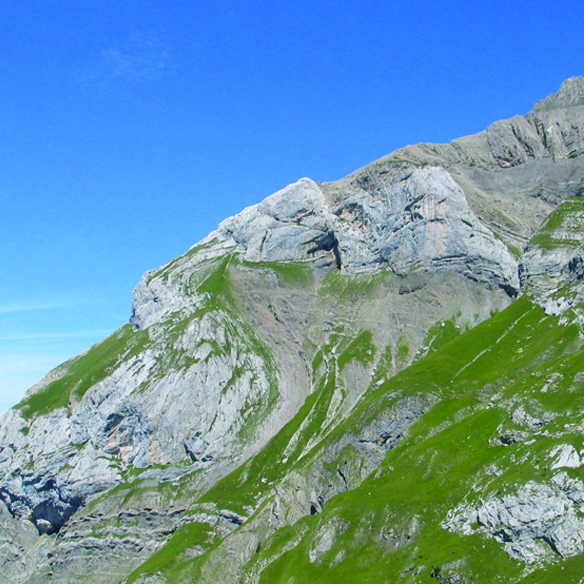Geology (GEOL)
Structures, deformation, sedimentation, magmatism and metamorphism of rocks within the lithosphere, including the development of orogens, foreland and sedimentary basins, interaction between Earth internal and surface processes.
Information: Prof. Anneleen Foubert (Fribourg), Prof. Marco Herwegh (Bern) or Prof. Fritz Schlunegger (Bern)
» Alpine geology
» Metamorphic and tectonic evolution of orogens
» Structures and deformation of rocks
» Surface processes
» Geodynamics and seismo-tectonics
» Geothermal energy
» Field survey

The curriculum of the Specialization in Geology spans the entire realm from unconsolidated soil to solid rock, on both small and large scales with a common theme: the understanding of geological processes and the results thereof in space and time. A careful selection of courses can provide a widely based education, with certain areas of increased expertise such as structures and tectonics, igneous and metamorphic petrology, mineralogy and sedimentology, thus preparing the students to tackle the huge variety of problems that are encountered in professional practice.
By specializing in Geology, various fields of professional activity in Earth sciences become available. Industry and government agencies throughout the world have a considerable demand for scientific experts in sectors such as sustainable resource supply (e.g. water, gravel, sand, hydrothermal), disposal of waste (both industrial and household), projections concerning the geological behaviour of the subsurface in construction projects or mining operations, assessing risk and ecological compatibility, etc. Many graduates of the institutes of Geological Sciences at the Universities in Bern and Fribourg are currently working in one of these fields in small or large companies, or in the private, public or academic sectors in Switzerland and abroad. Graduates and will be equipped for PhD studies and advanced academic careers at universities or research institutions.
This Specialization aims to equip graduates with the combination of skills required in professions within the sectors of resource supply, waste disposal, civil engineering, mining, natural hazard assessment and ecological compatibility studies. These include a broad understanding of geological processes; an ability to integrate diverse scientific information into concrete problem-solving strategies; hands-on expertise with modern field, analytical and computational methods; and practice in communicating ideas and results in a professional manner, both in written and oral form.
(30 ECTS in Module B)
Download list with GEOL master courses sorted by frequency (pdf)
(this list is updated in January each year)
Master students have access to a wide range of analytical facilities at the host institutes, including petrographic microscopy, grain-size analysis, cathodo-luminescence, scanning-electron microscopy, X-ray diffraction, electron microprobe, Laser-Raman and FTIR spectroscopy, laser-ablation-ICP-MS, fluid inclusion microthermometry, wet-chemical laboratories with ICP-OES and ion-chromatography, mass-spectrometers for stable isotopes of C, O, H, He, Ca, Mo, and for radiogenic isotopes of the Rb-Sr, Nd-Sm, and U-Pb systems. Computational facilities include computer clusters for numerical modeling and GIS applications.
Access is also offered to museum collections (mineralogy, palaeontology, petrography, meteorites).
Prospective students for the Specialization in “Geology” should contact the following instructors for further information:
Prof. Anneleen Foubert (Fribourg), Prof. Marco Herwegh (Bern) or Prof. Fritz Schlunegger (Bern)